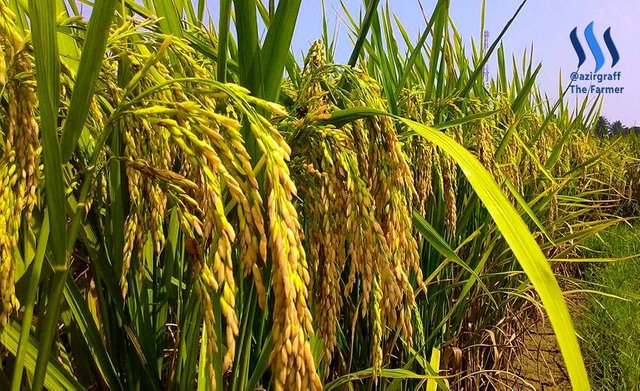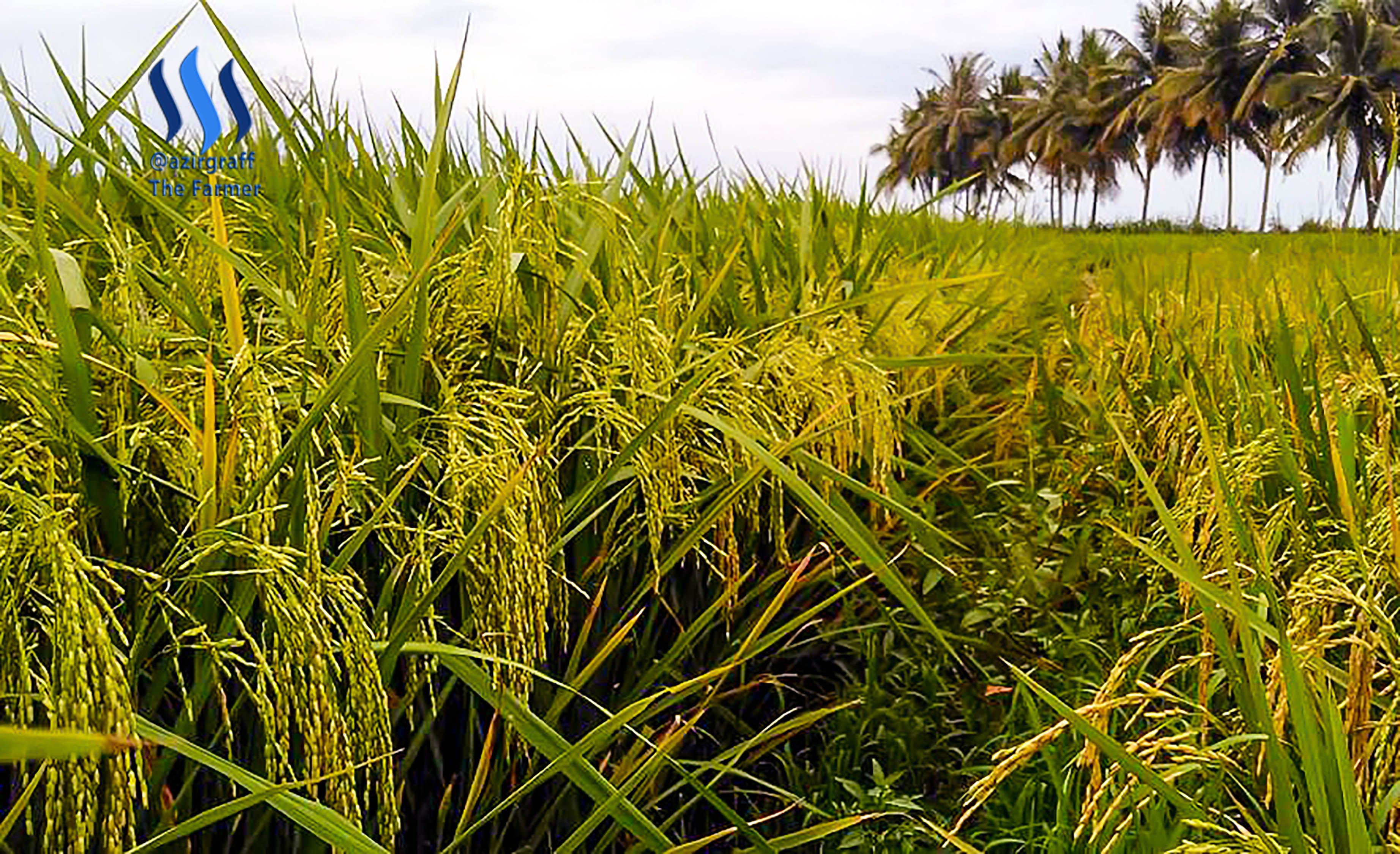Types of Rice Varieties and its Superiority
Greetings, all friends of Steemit how are you today, hopefully always healthy, today I write about three varieties of rice, may be useful.
Rice plants are one of the main crops cultivated by the community, because this plant is a major producer of staple foods. So in my post it will write about the types of varieties that exist in Indonesia.

This is a Ciherang rice planted by Sawang farmer, North Aceh. Photo Taken by @azirgraff
Rice varieties are one of the main technologies that can increase agricultural productivity and farmer income, This plant is called (oryza sativa.L). Rice is also one of the families of grass - the grass (poaceae), even rice has many carbohydrates and rice plants are widespread in all directions because this plant is easy to adapt.
In general, rice varieties are grouped into several groups namely superior rice varieties, Local type rice and Hybrid Rice. Here I will describe each of these varieties:
1. Varieties Superior Rice
Choosing the type of high yielding rice varieties that have high production is a must for farmers to be able to enjoy the abundant crops.
Thus, superior rice varieties can be planted many times with good treatment, From the development of this type of superior plant after harvest can be used as seeds back. Based on the research I found in farmers planting using superior seeds can be done up to 10 times more with results that are almost not much different.
Superior rice varieties are varieties that have been released by the government with the Minister of Agriculture Decree. This variety has passed various trials and the price of seed of this variety is cheap, reaching 5 thousand - 10 thousand per kilo.
An example of this superior variety of seedlings planted by farmers is CIHERANG (can reach 47% of the total planted varieties), IR-64, Mekongga, Cimelati, Cibogo, Cisadane, Situ Patenggang, Cigeulis, Ciliwung, Cimelati, Membramo, Sintanur, Jati sublime, Fatmawati, Situbagendit and others.
Since 2008, the naming of rice changed. For rice paddy called Inpari (Inbrid Rice Irrigation). For example: Inpari 1-10, Inpari 11, Inpari 12 and Inpari 13, etc. While from the BATAN has issued rice varieties: Cilosari, Diahsuci, Bestari, Inpari Sidenuk, Pandan Putri and others.
In 2010/2011 for Inpari varieties, INPARI 13 is a lot of many farmers planted. The government wants INPARI 13 to shift the cultivated varieties of cultivated peasants most.
For 2011 also, ICRR has issued new varieties with more varied advantages such as: Inpari 14 Pakuan, Inpari 15 Parahyangan, Inpari 16 Pasundan, Inpari 17, Inpari 18, Inpari 19, Inpari 20, Inpari 21 and others
For the year 2012 has been released several rice varieties, among others inpari 22-29.
For swamp (Inpara) is also widely released by the government. For example: Inpara 1-8, and others. Similarly for upland rice (inpago). For example: Inpago 1-5, and others
While the rice varieties that were launched by ICRR, Sukamandi Subang since 2005 are:
Year 2005 there is 1 that Ciasem
In 2006 there are 2 namely Sarinah and Aek Sibundong
In 2007 there are 3 namely. Hipa 5 Ceva and Hipa 6 Jete
In 2008 there were 9 of Inpara 1, Inpara 2, Inpara 3, Inpari 1, Inpari 2, Inpari 3, Inpari 4, Inpari 5 Merawu and Inpari 6 Jete
In 2009 there are 8 namely Inpari 7 Lanrang, Inpari 8, Inpari 9 Elo, Inpari 10 Laeya, Hipa 7, Hipa 8 Pioneer, Inpara 4 and Inpara 5
In 2010 there are 10 of Inpari 11, Inpari 12, Inpari 13, Hipa 9, Hipa 10, Hipa 11, Inpago 4, Inpago 5, Inpago 6 and Inpara 6
Year 2011 there are 7 for Rice Fields Inpari 14 - Inpari 20.
2. Hybrid Rice Varieties
Hybrid Rice Varieties are one of the experimental rice species by combining two or more different types of rice to produce a new rice.
Examples of hybrid rice are also many types, among others, namely: diamond 1, diamond 2, rokan, Adirasa1, Adirasa 64, H1, PP1, soon child B3, Sembada B9, SL 8 and SI 11.
This rice variety is a plant that is easy to adapt to the environment, meaning hybrid rice varieties belong to the plant once planted and the results will be maximized if once planted, But if the offspring (seeds) are planted back then the results will be far away. For the benefits of this hybrid rice is able to produce higher than inbred / non-hybrid rice yield, the better Vigor is more competitive to weeds.
In addition, when viewed the benefits of physiological aspects, root activity and photosynthesis area is more widespread, lower and higher assimilate translocations. While the advantages in some morphological characteristics such as stronger root system, more tillers, the number of grains per panicle more, and the weight of 1000 grains of higher content of grain.
In addition. Hybrid rice types also get shortages, these results we get from some sources of professional farmers who mentioned that there are some weakness from of hybrid rice that is, hybrid rice planted by farmers attacked by bacterial leaf blight (kresek), blight of midrib and blast, so different from the writing on the lebel, require more fertilization, very vulnerable to pest aphis, sundep / worms and caterpillar, many grains of melai unallocated, hybrid rice is only a particular location, the plant is tall and large, hybrid rice seeds can not be replanted by farmers, hybrid rice seed prices are much more expensive and require care and more careful attention.
But keep in mind that the factors of advantages and disadvantages are not stand alone, so many things that affect the benefits of hybrid rice such as panca appropriate efforts tailored to the potential location of each planting.
Hybrid rice varieties are also widely marketed by the government. But many are also imported from other countries.
3. Local Rice Varieties
Local rice varieties are rice varieties that have long been adapted in certain areas. So these varieties have location-specific characteristics in the area, Each variety has advantages and disadvantages. Likewise for the local varieties.
Examples of local varieties: varieties kebo, dharma ayu, ideal youth, (Indramayu), Gropak, Ketan wasps, Gundelan, etc. (Malang), Merong (Pasuruan), Simenep, Srimulih, Andel Jaran, Ketan Lusi, Horse Tail, to Gropak Kulon Progo-Jogja), and others.
Additional: Angkong, Bengawan, Engseng, Melati, Markoti, Longong, Yellow Rejung, Umbul-umbul, Tunjung, Rijal, Sri Kuning, Untup, Tumpang Karyo, Honey Framework, Kelai Rice, Copper, Tjina, and others.

This is a Ciherang rice planted by Sawang farmer, North Aceh. Photo Taken by @azirgraff
In the article "Local Padi Seed Must Supported by the Government" written by Lukas Adi Prasetya and Idha Saraswati was reported when the Festival of Rice Seed 2009 which was held on Friday and Saturday in Ganjuran, Bambanglipuro, Bantul, the seeds of local varieties of rice were introduced.
"This one is the Srimulih variety. The rice is similar to IR 64, both shape and taste. Excess Srimulih is, if eating, durable. IR rice, can not stay saturated. Srimulih rice plants are also not spoiled, "said Hendrastuti who is also as Coordinator General Network Kulon Progo Farmers this.
Thus, it is a picture that local seeds have no place in the hearts of people. If pulled back, this is who is wrong? Why are good and pest-resistant local seeds never orbited? Similarly, the local seeds of the cross, never appear on the surface?
But from other news sources, it was reported that in the last 10 years the government of West Sumatra has made local rice varieties as superior rice. Means, some local seeds that have passed the test has been launched by the government as a variety of superior seeds.
The 11 local superior varieties of West Sumatra include varieties of Red Caredek and Siarang Black rice in collaboration with Solok regency, Junjuang varieties with Limapuluh Kota regency, congenital varieties with Pesisir Selatan Regency.
By there fore. For plant researchers, these local varieties that in exist among the community to be crossed with superior varieties so that the offspring will produce better offspring
Conclusion
Varieties of rice crops are grouped into three types, namely superior varieties, hybrid rice varieties and local rice varieties. Three types of varieties each have their advantages and disadvantages. For farmers who usually use local rice varieties to be able to do kawinsilang system in order to get superior rice varieties.
The government should continue to develop agricultural systems and agricultural extension for more advanced agricultural development.
Here's what I can write about three types of rice varieties on this occasion, deficiencies in write certainly exist, then I keep apologizing. Thanks to all friends in Steemit who have visited my blog and comments in a constructive way.
Farmer life !!!
Supporting sources
The agribusiness sector is the largest and most important economic sector in the peasant economy.
Good @cuboegraff, thanks for you comment
Continue farming, you are sharing a useful post for farmers, it is very good, see our farmers are still far understanding of agriculture, then with the posting as you do, farmers can learn through steemit account.
Thanks @abenksteem
Tulisan yang bagus. Pakai bahasa inggris segala agar dpt dibaca olh orang dibelahan manapun
Thanks @ismadi, you are my teacher
@azirgraff. this post is evidence that scientifically very interesting about agribusiness
Thank you for your support @sward, hopefully I can continue to deepen my writing in agriculture
Good post @azirgraff, thank you
you can also learn about the hill rice plant (padee tajok) Aceh language, which is very simple planting.
Thank @boyasi, I will study first then I try to do it
Thanks @mmcsteem
uda di upvote ya ,,,follow back ok...salam steemit dan juga salam kenal